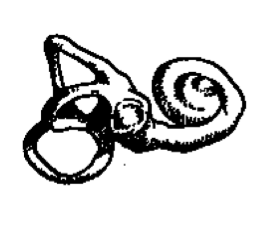The ear is a labyrinth. Imagine a sound getting lost in there, meeting up with itself after a series of wrong turns, doubling back to avoid a monster with an ax. What would such a sound… sound like? (In college my roommate listened to a group called Maze.)
Blame it on a wardrobe malfunction. Though I missed the infamous Super Bowl XXXVIII half-time show, I read about it the next day, over someone’s shoulder on the subway. The lyric “I’ll have you naked by the end of this song” seemed terrifying—not just the threat of Justin Timberlake peeling off the listener’s skivvies, but the regenerative nature of the threat within the duration of the music. The singer points to the limit of the artwork in question and says: You will be naked there. The world inside the song suddenly revealed itself as a nightmare of abandoned clothing and scary authorial confidence.
Now other terrors came to mind, musical Möbius strips. Some were chestnuts, others more recent favorites. Who doesn’t love the Beatles’ “I Will”? Yet now I was fixated on its endgame: “And when at last I find you / This song will fill the air.” Which song, Paul? This one? So then—if I’m hearing it right now—does that mean you’ve… found me? That you’re standing right behind me and—gaaaah! (Don’t do that!)
The moment of composition is no longer evident. The song does not exist as a discrete, safely reproducible aesthetic object. The present tense reasserts itself each time. It’s not the art that hides art, but the art that says look at me. It is what you might call postmodern.
How’s that? James Taylor, postmodernist? A plaintive line from that eternal classic, “Fire and Rain”—“I walked out this morning and I wrote down this song”—suddenly sounds dangerously unmoored. This morning; this song. When? Which? Help? “I just can’t remember who to send it to,” JT regrets.
Elton John did not have the same problem. “And you can tell everybody / This is your song,” he sings in “Your Song.” But can I? Would I want to boast about a song that explicitly acknowledges the fact that it’s mine—and the fact that I can tell everybody that it’s mine?
We fast-forward through the Me Decade (while acknowledging Carly Simon’s “You’re So Vain”: “You probably think this song is about you”—no, I don’t… though now that you mention it…) and land in the early ’80s on Billy Bragg’s “A New England”: “I was twenty-one years when I wrote this song / I’m twenty-two now but I won’t be for long.” Mr. Bragg—...
You have reached your article limit
Sign up for a digital subscription and continue reading all new issues, plus our entire archives, for just $1.50/month.
Already a subscriber? Sign in





